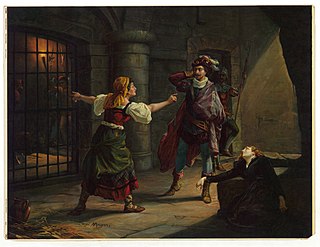
Il trovatore is an opera in four acts by Giuseppe Verdi to an Italian libretto largely written by Salvadore Cammarano, based on the play El trovador (1836) by Antonio García Gutiérrez. It was García Gutiérrez's most successful play, one which Verdi scholar Julian Budden describes as "a high flown, sprawling melodrama flamboyantly defiant of the Aristotelian unities, packed with all manner of fantastic and bizarre incident."

Bernardo BertolucciOMRI was an Italian film director and screenwriter with a career that spanned 50 years. Considered one of the greatest directors in Italian cinema, Bertolucci's work achieved international acclaim. He was the first Italian filmmaker to win the Academy Award for Best Director for The Last Emperor (1987), one of many accolades including a BAFTA Award, a César Award, and two Golden Globes. He also received a Golden Lion in 2007, and a Honorary Palme d'Or in 2011.

Jill Clayburgh was an American actress known for her work in theater, television, and cinema. She received the Cannes Film Festival Award for Best Actress and was nominated for the Academy Award for Best Actress for her breakthrough role in Paul Mazursky's comedy drama An Unmarried Woman (1978). She also received a second consecutive Academy Award nomination for Starting Over (1979) as well as four Golden Globe nominations for her film performances.
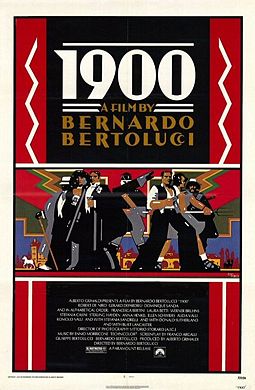
1900 is a 1976 epic historical drama film directed by Bernardo Bertolucci and featuring an international ensemble cast including Robert De Niro, Gérard Depardieu, Dominique Sanda, Francesca Bertini, Laura Betti, Stefania Casini, Ellen Schwiers, Sterling Hayden, Alida Valli, Romolo Valli, Stefania Sandrelli, Donald Sutherland, and Burt Lancaster. Set in Bertolucci's ancestral region of Emilia, the film chronicles the lives and friendship of two men – the landowning Alfredo Berlinghieri and the peasant Olmo Dalcò (Depardieu) – as they witness and participate in the political conflicts between fascism and communism that took place in Italy in the first half of the 20th century. The film premiered out of competition at the 1976 Cannes Film Festival.
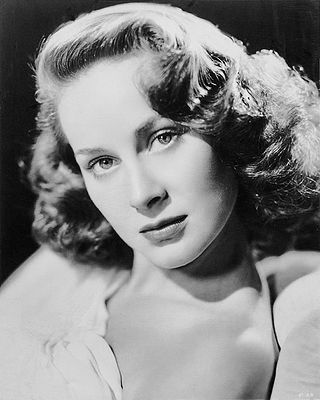
Alida Maria Laura, Freiin Altenburger von Marckenstein-Frauenberg, better known by her stage name Alida Valli, was an Italian actress who appeared in more than 100 films in a 70-year career, spanning from the 1930s to the early 2000s. She was one of the biggest stars of Italian film during the Fascist era, once being called "the most beautiful woman in the world" by Benito Mussolini, but managed to find continued international success post-World War II. According to Frédéric Mitterrand, Valli was the only actress in Europe to equal Marlene Dietrich or Greta Garbo.

Tomas Milian was a Cuban-born actor and singer with American and Italian citizenship, known for the emotional intensity and humor he brought to starring roles in European genre films.

Attilio Bertolucci was an Italian poet and writer. He was the father of film directors Bernardo and Giuseppe Bertolucci.
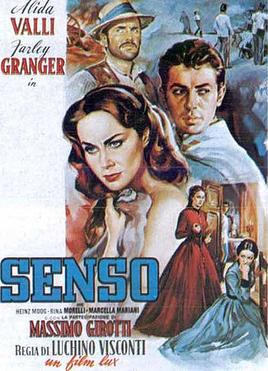
Senso is a 1954 Italian historical melodrama film directed and co-written by Luchino Visconti, based on Camillo Boito's novella of the same name. Set during the Third Italian War of Independence, the film follows the Italian Contessa Livia Serpieri, who has an affair with the Austrian Lieutenant Franz Mahler. It was Visconti's first color film.

Francesca Archibugi is an Italian film director and scriptwriter.
The David di Donatello Award for Best Supporting Actress is a film award presented annually by the Accademia del Cinema Italiano to recognize the outstanding performance in a supporting role of an actress who has worked within the Italian film industry during the year preceding the ceremony. It has been awarded every year since 1981.
The Nastro d'Argento is a film award assigned each year, since 1946, by Sindacato Nazionale dei Giornalisti Cinematografici Italiani, the association of Italian film critics.
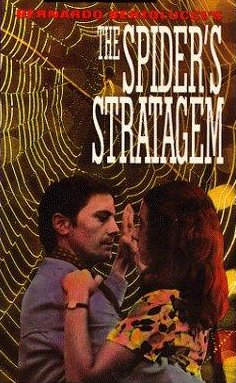
The Spider's Stratagem is a 1970 Italian made-for-television political mystery-drama film written and directed by Bernardo Bertolucci and produced by RAI. The screenplay is based on the 1944 short story Theme of the Traitor and the Hero by Jorge Luis Borges. The film stars Giulio Brogi and Alida Valli, and follows the son of an antifascist martyr who travels to his namesake’s father’s hometown, uncovering secrets of his father’s past in the process.

Invisible Chains is a 1942 Italian drama film directed by Mario Mattoli and starring Alida Valli, Carlo Ninchi and Giuditta Rissone. It was shot at the Cinecittà Studios in Rome. The film's sets were designed by the art directors Ottavio Scotti and Mario Rappini.
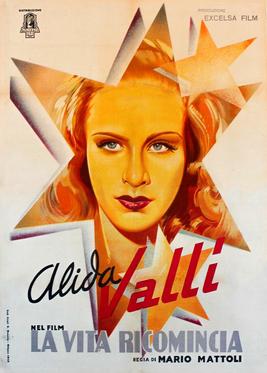
Life Begins Anew is a 1945 Italian melodrama film directed by Mario Mattoli and starring Alida Valli, Fosco Giachetti and Eduardo De Filippo. It was the second most popular Italian film during 1945-46 after Roberto Rossellini's Rome, Open City.

It's My Turn is a 1980 American romantic comedy-drama film starring Jill Clayburgh, Michael Douglas, and Charles Grodin.
When Innocence Is Lost is a 1997 American drama television film directed by Bethany Rooney and written by Deborah Jones. The music of the film was composed by Dennis McCarthy. It stars Keri Russell, Jill Clayburgh, Vince Corazza, Julie Khaner, and Charlotte Sullivan.

Berlinguer ti voglio bene is a 1977 Italian comedy film written and directed by Giuseppe Bertolucci. It is the debut film for both Bertolucci and Roberto Benigni.

The Stranger's Hand is a 1954 British-Italian thriller drama film directed by Mario Soldati and starring Trevor Howard, Alida Valli and Richard Basehart. An international co-production, it is based on the draft novel with the same name written by Graham Greene. The plot follows the son of a British MI5 agent kidnapped in Venice by agents of Yugoslavia as he searches for his father.

Disorder is a 1962 Italian-French comedy-drama film directed by Franco Brusati.

A Thousand Lire a Month is a 1939 Italian "white-telephones" comedy film directed by Max Neufeld and starring Alida Valli, Umberto Melnati and Osvaldo Valenti. It is a remake of the 1936 Hungarian film Havi 200 fix. The plot concerns an electronic engineer who goes to Budapest, accompanied by his girlfriend, to work on experiments for a new television system leading to countless mix-ups.
















